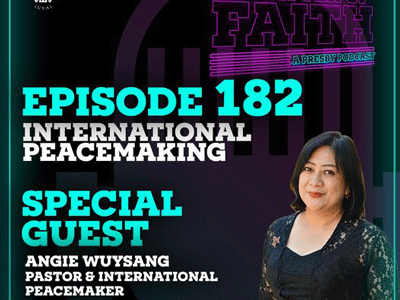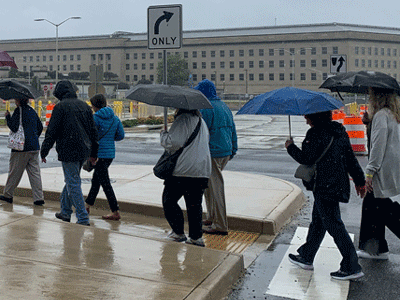Building strong interfaith relationships is a core commitment for Presbyterians. Jesus crossed all kinds of religious and cultural boundaries to build relationships of trust and love. We strive to follow his example in a religiously diverse world that seems to grow more divided every day.
Presbyterians believe that the growing religious diversity in the United States is an opportunity for Christians to demonstrate the love of Christ. Our task is to prepare our members to fully understand what makes our witness as Presbyterians distinctive, and to help our members reach across boundaries of religious differences to build relationships of trust with those who embrace or belong to other traditions, or to no tradition at all.
Click here to read the Inter-religious Stance, affirmed by our General Assembly in 2014, which guides us as we enter into relationships with those of other religious traditions.
As we step into intentional interfaith relationships with others (and they with us), it’s helpful to have an idea of the core convictions that Presbyterians hold dear.
About God …
Presbyterians believe that there is one God — Father, Son and Holy Spirit. Christians refer to the belief that there is one God in three persons as the Trinity. Christians affirm this because we believe that God has been revealed throughout history as God who created us, Jesus Christ as God made flesh, and the Holy Spirit as God’s ongoing presence in our lives. We understand Jesus as a great prophet and significant rabbi and teacher who is also fully God. The Holy Spirit offers a way of understanding the mystery of God and the sacred moments that often take us by surprise.
We often close our worship with a blessing that expresses the triune nature of God — something like this: “May the grace of our Lord Jesus Christ, the overwhelming love of God, and the fellowship and communion of the Holy Spirit be with you all.”
Presbyterians use confessions to declare to our own members and to the world who we are, what we believe and what we resolve to do. What makes Presbyterians unusual is that we don’t have a single confession; we have a Book of Confessions that compiles all the confessions we have affirmed throughout our history. We recognize that we are a work in progress, and that our understanding of God — and of who God calls us to be — is expressed over time and in each historical moment.
Sometimes we choose to incorporate confessions from other traditions that have particular relevance for us. The most recent addition to our Book of Confessions is the Belhar Confession, created by the white church in South Africa as it wrestled with its own complicity in apartheid. Though their context was different, we have affirmed together that this confession is instructive and even authoritative as we wrestle with our own issues involving race, racism, ethnicity and systems of white supremacy in the United States today. You can read about the vote at the 222nd General Assembly (2016) to adopt the Belhar Confession as our own in this article.
About grace and gratitude …
Presbyterian theology can pretty much be summed up by these two words. God freely extends God’s grace to all of God’s people, and we are called to respond in gratitude by loving and serving in Jesus’ name all those with whom we come in contact.
About a fully inclusive church …
In recent years, the Presbyterian Church (U.S.A.) has changed its constitution. The PC(USA) has taken the stand that it is faithful for congregations to have LGBTQ persons in leadership and for PC(USA) pastors to perform same-gender weddings. At the same time, the PC(USA) has affirmed that some faithful congregations may choose not to participate in same-gender weddings or to elect leaders who are openly LGBTQ.
Most Presbyterian churches and pastors are willing to be clear about their own understanding of how they extend welcome so that new folks can determine whether they will feel fully welcome and comfortable there, and interfaith partners can determine how to work respectfully with that congregation. In a similar manner, Presbyterians strive to respect and understand the positions of our interfaith partners on these and other matters as we enter into relationships with them.
About how people encounter God …
We believe that God can touch our individual lives in powerful ways. Presbyterians have personal and transformative experiences of Jesus and surrender our whole lives to the power of that relationship. Presbyterians are deeply moved by the mysteries of the Holy Spirit as we encounter it in countless ways in our lives. We experience God fully at work among us when we form daring communities that strive to live out the claim of the gospel in our lives, and we know that, by God’s grace, those communities have the power to transform the world around us.
About ritual …
Presbyterians center our lives on worship, and we call the practice of worship liturgy. We believe that it is God who calls us to worship, and that worship is an encounter with the living God. When we come together in worship it is our chance to deepen our fellowship with one another, to confess our failures with one another and to remind ourselves whom (is this use of “whom” correct?) God is calling us to be. Some churches have traditional liturgical practices that feel familiar to those of us who have gone to church all our lives, while others are creating new ways of worshiping together. In pretty much every church community, however, you’ll be able to identify the rituals that have grounded our people for hundreds of years.
About ecumenism …
Ecumenism is the word we use to describe our commitment to work with all Christians. We believe that the many divisions among the Christian family are a natural result of our passion and our desire to fully know God, but that our divisions are ultimately a sign of our failure to form the community of Christ. Presbyterians strive to break down the barriers between us and other Christians, and we often choose to work with our broader Christian family to respond to human suffering and injustice. This approach is reflected in the Ecumenical Stance that we affirmed at the 218th General Assembly (2008).
About ambiguity …
Most Presbyterians are pretty clear that God isn’t finished with us yet. Seeking to experience, understand and be changed by God is a lifelong project for each of us. When we allow for the possibility that God may be revealed to us in new ways, it allows us to love and serve with passion as we live into God’s claim on us and simultaneously to show humility in our awareness that we need one another — especially when we disagree — to complete our understanding of God.
To learn more about what Presbyterians believe click here.
Tough questions that come up in our interfaith work and relationships
Why do Presbyterians believe in interfaith work?
Presbyterians have a long history of reaching across lines of religious differences to form relationships of respect and even affection with sisters and brothers of other traditions. This is deeply grounded in our humble conviction that there is much about God that we cannot fully understand.
In 2014 the 221st General Assembly affirmed our Interreligious Stance which offers concrete suggestions for the ways in which we are called into honest relationships with those of other traditions. Presbyterians don’t work with multifaith partners in spite of our convictions; we do it because of our convictions.
What about religious violence and extremism?
Much of the violence in the world today is attributed to religion. Too often, religious leaders fan the flames of violence instead of speaking out for tolerance and respect for one another’s traditions. In other instances, those who stand to gain power or wealth through war and violence intentionally exacerbate religious differences. Presbyterians strive to confess our own complicity in the violence of our world today and to offer thoughtful, nuanced and occasionally bold and prophetic responses to violence.
In 2016, the 222nd General Assembly affirmed that nonviolence should be our first and most consistent response to the challenges of war, terrorism and structures of oppression in our time. We affirm this even as we recognize the complexity that exists in the world and the reality that there are no easy answers, nor is any one answer likely to be sufficient in all situations.
This is the statement that our General Assembly issued in 2016, after a six-year process of deliberation across the whole PC(USA) about how we must respond to violence in our time.
Do Presbyterians evangelize?
Presbyterians walk a fine line when it comes to evangelism and proselytizing to bring others to faith in Jesus Christ. We believe Jesus to be the Son of God who can liberate all people from sin and suffering — in our personal lives, in our and families, and in systemic structures of oppression that show up in every institution and governmental structure.
At the same time, we are deeply aware of our inability to ever fully know or understand God, and we understand God to be capable of revealing God’s self in all kinds of ways. As a result, we actively seek to build respectful and caring relationships with those of other religious traditions — and of no religious tradition — and we watch for ways to share the good news that has transformed our lives with others who may be seeking their own transformation.
Jesus Christ is the only Savior and Lord, and all people everywhere are called to place their faith, hope and love in him. No one is saved by virtue of inherent goodness or admirable living, for “by grace you have been saved through faith, and this is not your own doing; it is the gift of God” (Ephesians 2:8).
“No one is saved apart from God’s gracious redemption in Jesus Christ. Yet we do not presume to limit the sovereign freedom of ‘God our Savior, who desires everyone to be saved and to come to the knowledge of the truth’ [1 Timothy 2:4]. Thus, we neither restrict the grace of God to those who profess explicit faith in Christ nor assume that all people are saved regardless of faith. Grace, love, and communion belong to God, and are not ours to determine.” (emphasis added)
— Hope in the Lord Jesus Christ
What about multifaith families?
Many Presbyterians have family members (including spouses, children, parents and in-laws) who profess no religious tradition or embrace a different religious tradition. Our primary concern in such situations is to assure that family members speak honestly and share deeply with one another about their differences, and come to agreement about important matters such as how they will handle religious formation and identity in the home. You may find the resources in this Interfaith Toolkit helpful as you navigate the challenges of interfaith relationships within your own family.
Are Presbyterians confronting Islamophobia?
Presbyterians are committed to combating Islamophobia wherever it exists. We actively work to build positive relationships with Muslims in our communities (and sometimes in our own families). We recognize the pressure that Muslims are feeling in the United States as they are expected to answer for the actions of violent extremists within the Islamic tradition. We recognize that within Christianity there is also a history of violence that has been carried out in the name of God (e.g., the Ku Klux Klan which is becoming more visible and active again today). Our willingness to confess our own brokenness about ways in which we are all complicit in structures that promote violence is the foundation for the work we are called to do. We stand firmly against acts of hate and violence that are committed against our Muslim sisters and brothers.
What is the Presbyterian response to anti-Semitism?
Presbyterians are part of a broad, ecumenical effort that has taken place over the last sixty years to take responsibility for more than 1,900 years of Christian on Jewish violence culminating in the murder of six million Jews in the Holocaust. This effort includes a reexamination of the way that Jews are depicted negatively in scripture and historic documents of our church. Our seminaries are universally committed to carrying out this work in an ongoing way.
Anti-Semitism continues to be a real concern in our communities, and we are committed to stand with our Jewish sisters and brothers to combat instances of anti-Semitism whenever and wherever we encounter them. We are committed to constantly re-examine and confront our own biases even as we call out the anti-Semitism that is woven into the fabric of too many of our communities.
What about Israel and Palestine?
Presbyterians have deep roots in the Holy Land. Over the last 50 years we have spoken out consistently about our concern that the occupation must be brought to an immediate end, and that Palestinians and Israelis alike must be able to experience just distribution of resources, basic security and the protection of their fundamental human rights.
In 2014 our General Assembly voted to divest from three companies that were doing business in a way that supported and benefited economically from Israel’s occupation of Palestine. This action was the culmination of 10 years of thoughtful deliberation. Even as we took the action, we insisted that it must not be interpreted as a broad call for a blanket divestment of the state of Israel. You can read an FAQ about that action here.
How do Presbyterians do social justice work?
Striving for social justice is a fundamental commitment for Presbyterians. This is deeply grounded in our reading of both Old and New Testament Scriptures in which the Hebrew prophets, Jesus and his disciples, and the saints of the early church all exhort us to care for those who are most at risk or most oppressed in our world. This commitment has often led Presbyterians to take stands that are countercultural in our country. Examples include:
To see explanations of similar social justice issues that the church has taken a stand on, click here.
What about participating in others’ religious experiences?
Christians are often quick to invite people of other religious traditions to participate in our worship. When so, we strive to welcome them without denying our fundamental conviction that God has been made known in Jesus Christ through the power of the Holy Spirit. We also use great care not to inappropriately adopt the traditions and practices of others for our own experiences of worship or prayer.
Persons of other faiths also have convictions about their worship that shape how Christians should participate. Thus, we seek to demonstrate sensitivity and humility, knowing that different kinds of engagement are appropriate in different contexts. Comfort and centeredness in our understanding of who we are as Presbyterians allow us to experience moments of the sacred that take place in the meditative practice, prayer and worship of those in other traditions.
How are we in relationship with our Native American sisters and brothers?
Many Presbyterians are Native American, but Presbyterians also recognize that our relationships with Native Americans are interfaith. The 222nd General Assembly (2016) formally repudiated the Doctrine of Discovery, which is the Christian doctrine that has endured more than 500 years and has provided a mandate to Christians to forcibly convert indigenous peoples across the Western Hemisphere (and in the absence of said conversion, to kill them). Taking responsibility for mission efforts, including American Indian boarding schools, that have resulted in the destruction of Native American spiritual and cultural practices is an ongoing commitment that Presbyterians take seriously.
There is a standing committee of the General Assembly called the Committee on Ecumenical and Interfaith Relations that provides guidance to the whole church about how to build healthy relationships with those of other traditions. You can learn more about the elected members of that committee here.
The Presbyterian Mission Agency is committed to promoting strong interfaith relations at the grass-roots level.




